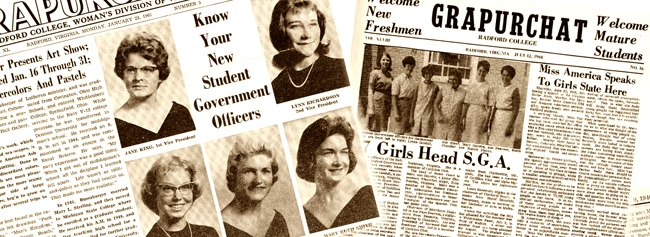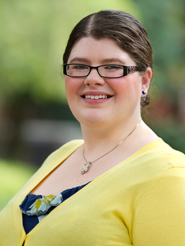Feature Story
SGA yesterday and today

By: Meghan Williams
While Radford University boasts more than 220 student organizations, none has the distinguished or longstanding history as the Student Government Association (SGA). Established on March 1, 1914, at what was then the State Normal and Industrial School for Women at Radford, the SGA of then and now reflects the university’s commitment to outstanding student leadership and scholarship.

Emily Redd, SGA president
The first known constitution for student government was established in 1918. The document affirmed the purpose of the organization as preserving student honor, promoting college spirit and settling matters concerning the best interest of the student body.
“With the adoption of the constitution in 1918, the student government association became one of the most important student organizations on the campus with an elaborate organization of far reaching effect,” wrote M’Ledge Moffett, Radford’s iconic first dean of women, in “A History of the State Teachers College at Radford, Virginia, 1910-1930.”
That sentiment holds true today. While Radford University has advanced in scope and stature, the student body has also multiplied. Now more than ever, student leaders such as the SGA president are looked upon as valued members of the university community and are elected to serve as visionary advocates for their peers and the greater campus community.
The original function of the SGA at the State Normal and Industrial School for Women was to handle conduct matters. The conduct concerns of yesteryear could be considered old fashioned by today’s standards. Imagine what campus might have been like when flirting from residence hall windows, walking downtown without a hat or waving at trains were shocking infractions. By 1920, however, a societal shift was emerging. During that time the organization began to reflect a more modern, general student government. By 1929, greater freedoms were granted to students, and SGA placed less emphasis on disciplinary actions.
Living, learning and serving
Although we may not ever know exactly the reasons why a Radford woman from the early 20th century decided to serve her campus as a student leader, current SGA President Emily Redd of Galax, explains why she serves the Radford University community today. “I am a grant and scholarship student; that’s how I am able to attend Radford University, so I feel indebted to all those who have helped me get here. I’ve always felt a strong urge to give back as much as I can. I always give 100 percent. It’s how I live.”
Being SGA president is not Redd’s first stint as a student leader. Even in high school she was giving it her all as drum major for the marching band and president of Interact, a service club sponsored by Rotary International for students 12 to 18. The program encourages students to complete community service projects while developing leadership skills, respect for others, and advancing international goodwill and understanding.
Because of her desire to make a difference and play an active role on campus, Redd became an Admissions Office tour guide and a peer instructor through New Student Programs not long after enrolling. That involvement eventually led her to SGA, where during her sophomore year she was elected class senator.
In fall 2011, while serving as vice president for SGA, Redd was appointed president when the previous leader stepped down. In spring 2012, Redd’s peers elected her SGA president for the 2012-13 academic year; it’s a job she knew she could do and one that she wanted.
Once Redd, a senior majoring in English and minoring in political science and history, graduates, she plans to attend law school. She is confident the skills, connections and patience she has acquired through SGA will benefit her in that pursuit.
Even leaders need a little guidance
A tradition of student governance nearly as old as the institution could not thrive without the guidance of faculty and staff mentors. In the organization’s earliest years, advisors such as the dean of women or the president supported the functions of SGA. Now, nearly 100 years later, Dean of Students Don Appiarius, associate vice president for student affairs, plays that role.
“First and foremost, my role as the SGA advisor is to be an educator and to help SGA representatives understand and appreciate the importance of processes and procedures. I also support them so they are the most effective and appropriate student advocates they can be,” Appiarius said. “The ability for students to lead is important to the governance and health of any institution. As with all organizations, a student government association grows and develops based on how strong the foundation is. Radford University’s Student Government Association is unique to have such a rich and deep history.”
As an advisor at universities before his tenure at Radford, Appiarius said working with SGA is one of the most enjoyable aspects of his work in student affairs. “I feel very blessed to interact with some of the finest students at Radford on a daily basis. This past year, when the mantle of leadership was thrust upon Emily, she rose to the occasion. She is leading the organization in a way that has shown her to be exceptional and thoughtful.”
Looking ahead
While Redd is honored to serve the university community and is confident in her capabilities, she acknowledges the job takes a lot of hard work and dedication. She credits past leaders and university administrators for their commitment to the organization and for setting a positive example of how a successful SGA should operate. “SGA has a history with just about every department on campus. The administration takes us seriously as an organization and as individual leaders, which is vital to student life.”
Redd notes that some of the biggest initiatives outlined in the most recent constitution of the SGA highlight the significance of sustainability, diversity and community outreach activities. However, engrained in SGA is still a commitment to school spirit and Highlander pride, as well as a pledge to serve as the voice of all students through active involvement in university-wide internal governance committees.
“SGA is an integral part of the Radford University experience and culture. It allows students the ability to have a conversation and not just a voice,” Redd said. “It is an organization of thinkers, dreamers, achievers and believers. I look forward to a legacy of positive change. I want to help students rediscover and embrace the idea of student representation and provide future SGA leaders a platform to connect with faculty and administration.”
While the world and its ideals have grown and changed since the establishment of SGA at Radford University, the organization’s fundamental qualities and perspectives remain constant and true with leaders like Emily Redd and all those who served before her.